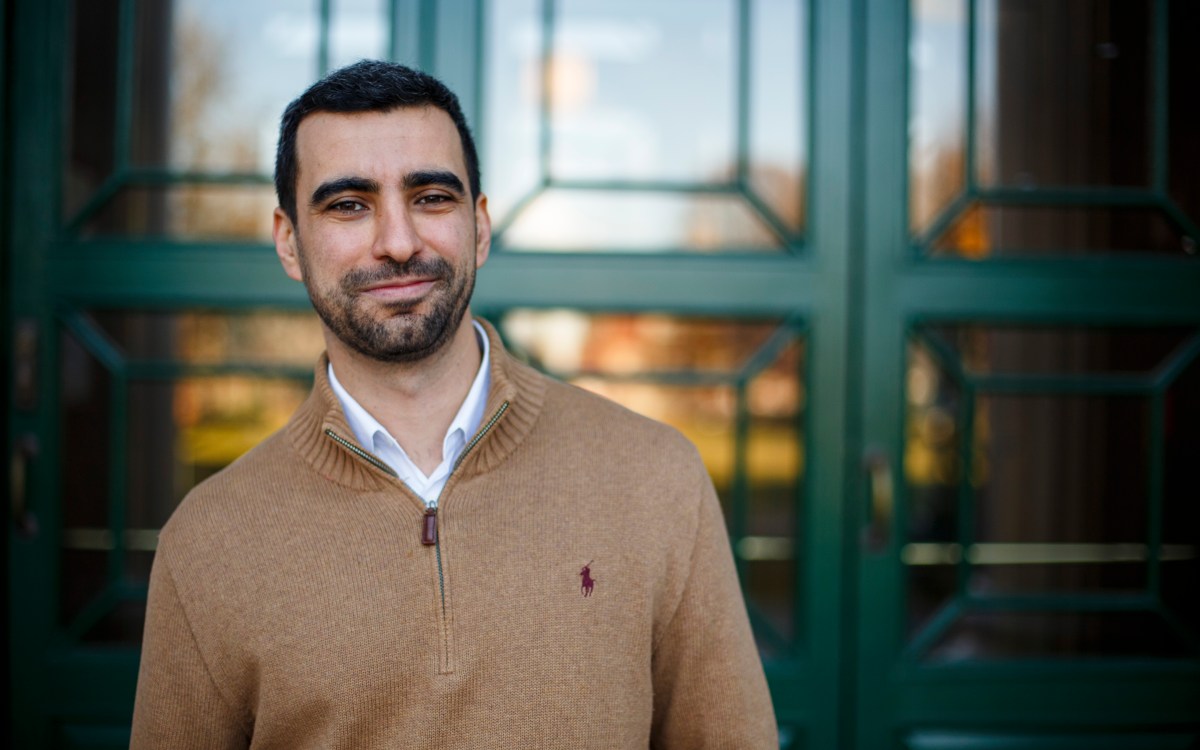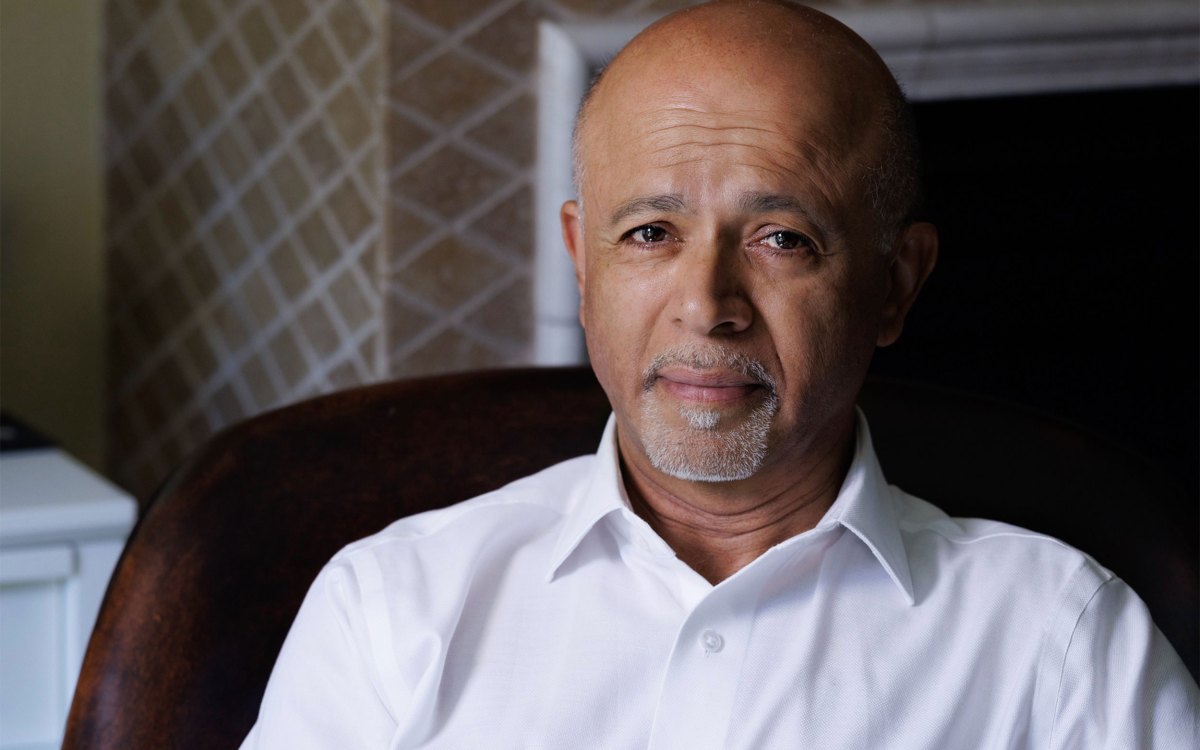Campus & Community
-

5 things we learned this week
How closely have you been following the Gazette? Take our quiz to find out.
-

Donald Lee Fanger, 94
Memorial Minute — Faculty of Arts and Sciences
-

Atul Gawande named featured speaker for Harvard Alumni Day
Acclaimed surgeon, writer, and public health leader will take the stage at Harvard’s global alumni celebration on June 6
-

Sense of isolation, loss amid Gaza war sparks quest to make all feel welcome
Nim Ravid works to end polarization on campus, across multicultural democracies
-

4 things we learned this week
How closely have you been following the Gazette? Take our quiz to find out.
-

Abraham Verghese, physician and bestselling author, named Commencement speaker
Stanford professor whose novels include ‘Covenant of Water’ to deliver principal address May 29
-
Titanic effort
Wheelchair marathoner William Tan experiences the loneliness of the long-distance racer as he hauls it up Heartbreak Hill last Marathon Monday. Tan dedicated his efforts to Childrens Hospital, raising money as part of Childrens Kids at Heart Marathon Team.
-
Graduate cyber-seminar breaks new ground
In the Locke seminar room in the Barker Center, students in History 2661, Graduate Readings in 20th Century African American History, are discussing a biography of W.E.B. Du Bois with their professors, Evelyn Brooks Higginbotham and David Levering Lewis. Lewis brings a unique perspective to the conversation: Hes the books Pulitzer Prize-winning author.
-
Al Franken is Class Day speaker
Political satirist and comedian Al Franken will share his wit and wisdom with this years outgoing seniors as the 2002 Class Day speaker, the Harvard College Class of 2002 Senior Class Committee announced Tuesday (April 16).
-
Spencer Foundation head new GSE dean
Following a nationwide search that began last fall, President Lawrence H. Summers announced Tuesday, April 9, that he has appointed Ellen Condliffe Lagemann, leading historian of education and president of the Chicago-based Spencer Foundation, as the next dean of the Graduate School of Education.
-
Building faith
In March, 23 volunteers from Harvard traveled to rural North Carolina to rebuild the Antioch United Holy Church, destroyed by arson. Their work transformed the students as well as the church. Gazette photographer Justin Ide and writer Beth Potier joined them to document this Alternative Spring Break experience.
-
Eating fish may reduce risk of sudden death
Eating more fish may help save your life, according to two new studies.
-
Spencer Foundation head new GSE dean
Following a nationwide search that began last fall, President Lawrence H. Summers announced Tuesday, April 9, that he has appointed Ellen Condliffe Lagemann, leading historian of education and president of the Chicago-based Spencer Foundation, as the next dean of the Graduate School of Education. Lagemann succeeds Jerome T. Murphy, who served as dean from 1992 through June 2001, and Judith Singer and John Willett, who have served jointly as acting dean since Murphys departure. Lagemann will assume her duties in July.
-
Special Notice: Commencement exercises for June 6, 2002
Morning Exercises
-
This month in Harvard history
April 29, 1636 – John Harvard marries Ann Sadler, sister of the Master of Magdalene College, Cambridge University. Just over a year later, they emigrate to New England.
-
Police reports
Following are some of the incidents reported to the Harvard University Police Department (HUPD) for the week ending Saturday, April 6. The official log is located at 1033 Massachusetts Ave., sixth floor.
-
President and Provost office hours
President Lawrence H. Summers and Provost Steven Hyman will hold office hours for students in their Massachusetts Hall offices from 4 to 5 p.m. Individuals wishing to meet with President Summers or Provost Hyman will be welcomed on a first-come, first-served basis. A Harvard ID is required.
-
March Madness, legal style
March Madness came to Harvard Law School (HLS) this year, even though the only court students set foot on was a court of law.
-
Notes
Employee discount at Peabody
-
The Big Picture: A snapshot of the Harvard Community
He is quiet and unassuming, but massage therapist Bob Collins attracts a lot of attention as he walks through a Holyoke Center administrative office. A chorus of unsolicited praise pours from offices: Hes amazing. The best. One touch and I was hooked.
-
Inside scoop on Nobels
Per Wästberg, a prolific Swedish author, human rights advocate, and a member of the Nobel Prize Committee for Literature, was at Harvard April 4 for a luncheon at the Faculty Club, sponsored by the Harvard Foundation. Wästberg, who earned a Harvard A.B. degree in Comparative Literature in 1955, recalled being accidentally locked overnight in Widener Library. I thought it was paradise, he said. At 7:30 p.m., Wästberg delivered the Inaugural Peter J. Gomes Lecture in the Memorial Church, titled, The Nobel Prize: Who Gets It and Who Does Not?
-
Arts First grants are announced by OFA
The Office for the Arts (OFA) has announced its support of 19 student arts projects taking place during Arts First weekend (May 2-5). Sponsored by the OFA grants program and selected by the Council on the Arts, the projects range from music and the visual arts to theater and the cultural arts. The Council on the Arts, a committee of the Faculty of Arts and Sciences, responded favorably to 78 percent of the grant requests. Council members include Robert J. Kiely (chair), Elizabeth Bergmann, S. Allen Counter, Deborah Foster, Jorie Graham, Christopher Killip, H. Peik Larsen, Cathleen McCormick, Jack Megan, Robert J. Orchard, Kay Kaufman Shelemay, Marcus Stern, and John Stewart.
-
Home sweep home:
After a rough road trip that saw the Harvard womens tennis team (6-7, 2-0 Ivy) drop five of six matches to schools in Florida, South Carolina, and California, the Crimson returned to the Murr Center Courts this past Friday and Saturday (April 5-6) for a two match home sweep. Harvard served up a pair of 5-2 wins against both Cornell and Columbia to open its Ivy League season in style.
-
Model helps predict quake damage
Drop a pebble into a still pool and youll see a series of smooth, shallow ripples emanating from it in a tidy concentric progression. Drop a computer-simulated earthquake onto a map of, say, Los Angeles, and youll see the same thing, right? Not anymore, thanks to a team of Harvard and California Institute of Technology researchers led by John Shaw. Now youll see a frantic jumble of jagged peaks and valleys, a bizarre dream of color and motion with no apparent pattern or symmetry. Its like an animated, three-dimensional, rainbow-hued EKG.
-
Ness ’04 scores:
For Alexander Ness, composing is its own reward.
-
Gift of photos goes to College Library
The American photographer and ethnographer Josephine Powell spent years in North Africa and the Middle East, documenting local architecture, textiles, nomad life, and village cultures. Traveling on horseback to some of the most isolated parts of these regions, Powell became a legendary figure among the people she encountered and stories were often told about this fearless American woman. This month a gift from Powell, a unique collection of her photo negatives and contact sheets, became a part of the Harvard College Librarys collection and will be housed at the Fine Arts Library.
-
Marathon man speeds help to others
William Tan has miles to go before he rests.
-
Should social policy reward marriage?
Close to 200 people, most of them women, gathered in a tastefully appointed meeting room at the Radcliffe Institute for Advanced Studies on April 8. They came to hear a talk called From Welfare to Wedlock: Should Social Policy Promote Marriage and Fatherhood? While outside the French doors daylight savings time graced a terrace with muted light, Gwendolyn Mink, professor of Womens Studies from Smith College, delivered troubling news for poor single mothers in 21st century America, and exhorted the crowd to help reverse what she views as an oppressive trend.
-
Armstrong to deliver Peabody Lecture
Karen Armstrong will deliver the 2002 Francis Greenwood Peabody lecture at the Memorial Church, on Saturday, April 13, at 10:30 a.m. The title of her talk is Faith After Sept. 11th. A prolific writer and well-known commentator on religious matters, Armstrong is the best-selling author of A History of God: The 4,000-Year Quest of Judaism, Christianity and Islam, A Short History of Islam, and The Buddha. Last spring, Armstrong delivered the Paul Tillich Lecture on the topic The Search for the Sacred at the Memorial Church.
-
Head of the class
President Lawrence H. Summers returns to the classroom as a guest lecturer for Psychology and Economics, EC 1030, at the Bio Lab.
-
Rubin, Summers, to speak on globalization at colloquium
At the 2002 Harvard Colloquium on International Affairs, panel discussions sponsored by more than a dozen Harvard Schools, centers, and programs will focus on what has changed in world affairs since Sept. 11 and what has not. Participants in this April 12-13 event include world leaders, scholars, journalists, CEOs, and high-level U.S. and foreign officials.
-
Improvising outreach:
Anita Hamilton put her arm around the shoulders of the boy in the gray sweatshirt and cooed in his ear: Bop, bop, boodily bop, beedily bebop, beedily bop.
-
Champion of disadvantaged, Monro, dies at 89
John Monro, a former dean of Harvard College whose long career as an administrator and teacher was dedicated to bringing higher education within the reach of poor and minority students, died March 29 at the age of 89.
-
Future of Inuit explored:
Sheila Watt-Cloutier traveled by dog sled when she was a girl in Canadas frozen north. Today, 40 years later, the snowmobile has replaced the dog as the main mode of travel for Canadas Inuit.
-
CPL announces doctoral fellowship
The Center for Public Leadership at the Kennedy School of Government has announced the availability of one doctoral fellowship for the 2002-03 academic year. The fellowship, designed to provide the successful applicant with the opportunity to complete, or make significant progress toward the completion of his or her dissertation, is open to any student in good standing in a Harvard University doctoral or advanced degree program. Generally, the successful applicant will have advanced to doctoral candidacy. Applicants who have not yet advanced to candidacy, however, may be considered.
-
Reflections on chaos
In Gut Reflections. Israel. Palestine. 2002, Israeli artist Adi Yekutieli uses diverse artistic media to convey an emotional response to the ongoing conflict between Israelis and Palestinians. Subtle yet powerful, Yekutielis work avoids the use of violent images or specific coherent political statements, focusing instead on the human condition.


